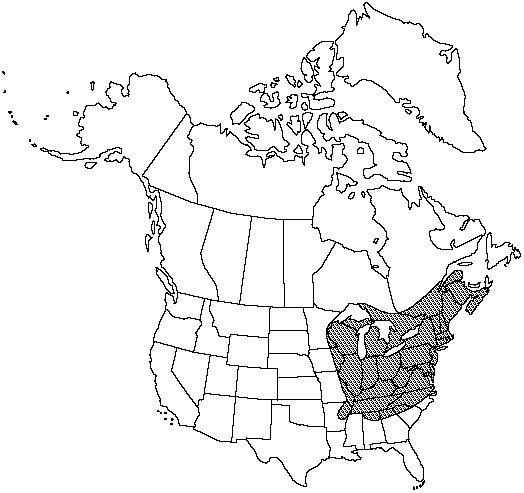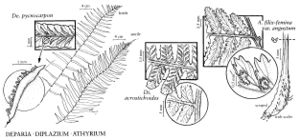Difference between revisions of "Deparia acrostichoides"
Ann. Carnegie Mus. 49: 177. 1980.
FNA>Volume Importer |
imported>Volume Importer |
||
| (7 intermediate revisions by 2 users not shown) | |||
| Line 8: | Line 8: | ||
}} | }} | ||
|common_names=Silvery-spleenwort;silvery glade fern;athyrie fausse-thélyptère | |common_names=Silvery-spleenwort;silvery glade fern;athyrie fausse-thélyptère | ||
| − | |basionyms={{Treatment/ID/ | + | |special_status={{Treatment/ID/Special_status |
| + | |code=F | ||
| + | |label=Illustrated | ||
| + | }}{{Treatment/ID/Special_status | ||
| + | |code=E | ||
| + | |label=Endemic | ||
| + | }} | ||
| + | |basionyms={{Treatment/ID/Basionym | ||
|name=Asplenium acrostichoides | |name=Asplenium acrostichoides | ||
|authority=Swartz | |authority=Swartz | ||
| + | |rank=species | ||
| + | |publication_title=J. Bot. (Schrader) | ||
| + | |publication_place=1800(1): 54. 1800 | ||
}} | }} | ||
|synonyms={{Treatment/ID/Synonym | |synonyms={{Treatment/ID/Synonym | ||
|name=Athyrium acrostichoides | |name=Athyrium acrostichoides | ||
|authority=(Swartz) Diels | |authority=(Swartz) Diels | ||
| − | }}{{Treatment/ID/Synonym | + | |rank=species |
| + | }} {{Treatment/ID/Synonym | ||
|name=Athyrium thelypterioides | |name=Athyrium thelypterioides | ||
|authority=(Michaux) Desvaux | |authority=(Michaux) Desvaux | ||
| − | }}{{Treatment/ID/Synonym | + | |rank=species |
| + | }} {{Treatment/ID/Synonym | ||
|name=Diplazium acrostichoides | |name=Diplazium acrostichoides | ||
|authority=(Swartz) Butters | |authority=(Swartz) Butters | ||
| + | |rank=species | ||
}} | }} | ||
|hierarchy=Dryopteridaceae;Deparia;Deparia acrostichoides | |hierarchy=Dryopteridaceae;Deparia;Deparia acrostichoides | ||
| Line 29: | Line 42: | ||
}}<!-- | }}<!-- | ||
| − | --><span class="statement" id="st- | + | --><span class="statement" id="st-undefined" data-properties=""><b>Stems </b>short-creeping. <b>Petiole</b> dark red-brown at base, straw-colored distally, 10–45 cm, swollen, with 2 rows of teeth; scales at base light brown, linear-lanceolate to lanceolate. <b>Blade</b> oblong-lanceolate, pinnate-pinnatifid, 30–80 × 12–25(–30) cm, narrowed to base, broadest near middle, acuminate at apex. <b>Pinnae</b> linear-oblong, base truncate, apex acuminate; segments oblong, margins entire to slightly lobed, apex round to slightly pointed. <b>Costae</b> and veins with multicellular hairs. <b>Veins</b> pinnate, lateral veins simple or 1-forked. <b>Sori</b> elongate, straight or hooked; indusia ± thick, margin ± entire. <b>2n</b> = 80.</span><!-- |
-->{{Treatment/Body | -->{{Treatment/Body | ||
| Line 35: | Line 48: | ||
|elevation=30–1500 m | |elevation=30–1500 m | ||
|distribution=N.B.;N.S.;Ont.;P.E.I.;Que.;Ala.;Ark.;Conn.;Del.;Ga.;Ill.;Ind.;Iowa;Ky.;Maine;Md.;Mass.;Mich.;Minn.;Mo.;N.H.;N.J.;N.Y.;N.C.;Ohio;Pa.;R.I.;S.C.;Tenn.;Vt.;Va.;W.Va.;Wis. | |distribution=N.B.;N.S.;Ont.;P.E.I.;Que.;Ala.;Ark.;Conn.;Del.;Ga.;Ill.;Ind.;Iowa;Ky.;Maine;Md.;Mass.;Mich.;Minn.;Mo.;N.H.;N.J.;N.Y.;N.C.;Ohio;Pa.;R.I.;S.C.;Tenn.;Vt.;Va.;W.Va.;Wis. | ||
| − | |discussion=<p>Deparia acrostichoides belongs to sect. Lunathyrium. Closely related Asian ferns have been treated as conspecific with Deparia acrostichoides, but D. acrostichoides differs from them in having creeping stems with rather distant leaves and pinnate-pinnatifid leaves. Deparia acrostichoides and Asian species such as D. pycnosora (H. Christ) M. Kato and D. allantodioides (Beddome) M. Kato are examples of vicariant species pairs with amphipacific disjunct distributions.</p> | + | |discussion=<p><i>Deparia acrostichoides</i> belongs to sect. Lunathyrium. Closely related Asian ferns have been treated as conspecific with <i>Deparia acrostichoides</i>, but <i>D. acrostichoides</i> differs from them in having creeping stems with rather distant leaves and pinnate-pinnatifid leaves. <i>Deparia acrostichoides</i> and Asian species such as D. pycnosora (H. Christ) M. Kato and D. allantodioides (Beddome) M. Kato are examples of vicariant species pairs with amphipacific disjunct distributions.</p> |
|tables= | |tables= | ||
|references= | |references= | ||
| Line 44: | Line 57: | ||
-->{{#Taxon: | -->{{#Taxon: | ||
name=Deparia acrostichoides | name=Deparia acrostichoides | ||
| − | |||
|authority=(Swartz) M. Kato | |authority=(Swartz) M. Kato | ||
|rank=species | |rank=species | ||
| Line 57: | Line 69: | ||
|publication title=Ann. Carnegie Mus. | |publication title=Ann. Carnegie Mus. | ||
|publication year=1980 | |publication year=1980 | ||
| − | |special status= | + | |special status=Illustrated;Endemic |
| − | |source xml=https:// | + | |source xml=https://bitbucket.org/aafc-mbb/fna-data-curation/src/2e0870ddd59836b60bcf96646a41e87ea5a5943a/coarse_grained_fna_xml/V2/V2_473.xml |
|genus=Deparia | |genus=Deparia | ||
|species=Deparia acrostichoides | |species=Deparia acrostichoides | ||
| − | |||
| − | |||
| − | |||
| − | |||
| − | |||
| − | |||
| − | |||
| − | |||
| − | |||
| − | |||
| − | |||
| − | |||
| − | |||
| − | |||
| − | |||
| − | |||
| − | |||
| − | |||
| − | |||
| − | |||
| − | |||
| − | |||
| − | |||
| − | |||
| − | |||
}}<!-- | }}<!-- | ||
-->[[Category:Treatment]][[Category:Deparia]] | -->[[Category:Treatment]][[Category:Deparia]] | ||
Latest revision as of 21:23, 5 November 2020
Stems short-creeping. Petiole dark red-brown at base, straw-colored distally, 10–45 cm, swollen, with 2 rows of teeth; scales at base light brown, linear-lanceolate to lanceolate. Blade oblong-lanceolate, pinnate-pinnatifid, 30–80 × 12–25(–30) cm, narrowed to base, broadest near middle, acuminate at apex. Pinnae linear-oblong, base truncate, apex acuminate; segments oblong, margins entire to slightly lobed, apex round to slightly pointed. Costae and veins with multicellular hairs. Veins pinnate, lateral veins simple or 1-forked. Sori elongate, straight or hooked; indusia ± thick, margin ± entire. 2n = 80.
Habitat: Damp woods, often on slopes
Elevation: 30–1500 m
Distribution

N.B., N.S., Ont., P.E.I., Que., Ala., Ark., Conn., Del., Ga., Ill., Ind., Iowa, Ky., Maine, Md., Mass., Mich., Minn., Mo., N.H., N.J., N.Y., N.C., Ohio, Pa., R.I., S.C., Tenn., Vt., Va., W.Va., Wis.
Discussion
Deparia acrostichoides belongs to sect. Lunathyrium. Closely related Asian ferns have been treated as conspecific with Deparia acrostichoides, but D. acrostichoides differs from them in having creeping stems with rather distant leaves and pinnate-pinnatifid leaves. Deparia acrostichoides and Asian species such as D. pycnosora (H. Christ) M. Kato and D. allantodioides (Beddome) M. Kato are examples of vicariant species pairs with amphipacific disjunct distributions.
Selected References
None.
